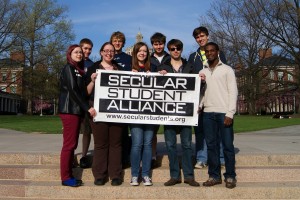
Courtesy of Gerard Markham
There are a fair number of religious groups on campus — Hillel, Catholic Newman Community and Muslim Students’ Association, just to name a few. Rochester Secular Student Alliance (RSSA), though, has created a community for non-theists to call their home, as well as a forum for discussion between theists and non-theists to further educate both parties.
The group, which has about 42 active members, was founded just last year and became Students’ Association-recognized in March 2011.
The Campus Times caught up with its founder and president, junior Gerard Markham, to talk about the club and secularism itself.
Why did you decide to form RSSA?
I was raised Christian all my life and so, for my entire life, I had the Bible pretty much pushed down my throat. It was only until I got to college that I realized that I wanted to start a group for non-theists. The University community really needed a group because non-theists weren’t represented.
What is the objective of RSSA?
It’s really to provide a community for non-theists. A lot of our members haven’t necessarily come out to their parents that they are non-theists, so it’s really just [to] provide a community [in which] we can talk about religion [and] also to tear down the negative stigma that surrounds being atheist or agnostic.
I guess [the objective is] also to hold interfaith discussions because I think that there’s a strong need for non-theists to speak with theists so they can get on the same page and learn more about each other’s beliefs.
What is your definition of a secular student?
If you ask each of the members of our group, you’re going to get over a hundred different definitions.
What’s your personal definition?
I think the most politically correct definition of a secular student would be one who is not overtly or specifically religious and [who] finds religion indefinite, inadequate or unbelievable due to [a] lack of evidence.
Can you describe some events that RSSA has held?
We’ve done a lot. Our most recent event that’s been really, really big was the Reason Rally that happened in Washington, D.C. It’s the largest gathering of non-theists in the country, so there were thousands of people there. We held a Darwin Day lecture series [and] we’ve also attended some of the interfaith events at the Interfaith Chapel.
Would you say that secularism is a movement in and of itself?
Nationally it’s called the New Atheist Movement. It’s all about making sure that people who are non-theists or atheists aren’t stigmatized and … have [their] voices heard.
What kinds of relationships do you have with religious groups on campus?
We’re still working on some of those relationships — right now we have a really good relationship with [Campus Crusade for Christ] and … we’re planning to do a panel talk. We [also] attend the religious roundtable events.
Have you ever felt any opposition to RSSA?
It’s not as bad as I would have expected it to be. I think the very first time we flyered, [just to] raise awareness that we had a group like this on campus, we got a few emails from some pretty upset graduate students from the Simon School. They were just mad that we had “littered the campus” with flyers about our group. Other than that, we haven’t really seen too much opposition.
Do you interact with the Rochester community in any way?
There’s a group called Rochester Atheists and our events coordinator, [sophomore] Sabina Noll, is really active in that group off campus, so we’ve invited them to a few events. We also attend some of the events at different schools.
What do you want to see for RSSA in the future?
I’d like to see the group grow. I think, coming from a Christian background, the biggest thing I would like to see is more interfaith events going on and more discussions about religion in and of itself because there are a lot of things that people who are non-theists need to learn about theism, and I think the same is true vice versa.
Until we have that communication, I don’t think there’s much progress that will be going on.
Goldin is a member of the class of 2013.
